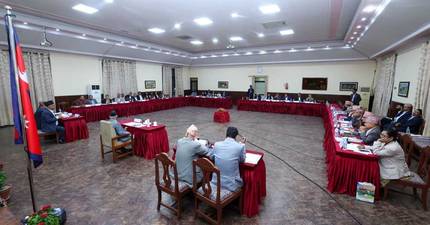The Mid-West University in Surkhet has made remarkable progress in recent times, particularly in the areas of infrastructure and intellectual development. Over the past five years, the university has witnessed a significant increase in the number of students, making it a prominent educational institution in the country.
Despite the challenges posed by the COVID-19 pandemic and various disruptions, the university has made notable strides in policy regulation, physical infrastructure development, educational and intellectual advancement, national and international relations development, and administrative efficiency within a short period of time.
With seven faculties, 50 programs, 20 academic institutions, 600 staff members, and 13,000 students over the past 13 years, the university has expanded its academic offerings. Recently, it has initiated a campaign where students, after completing their bachelor's degrees in agriculture, engage in the production of items such as soap and oil through herbal industries.
Financially, the university has shown prudence, with a 100% expenditure of the allocated budget and a significant reduction in unnecessary expenses. The recent budget has surged to NPR 1.2 billion, including a grant of NPR 2.7 million from the University Grants Commission for agricultural entrepreneurship. The university aims to generate an annual income of NPR 250 million from various sources, including 70% international, 10% national, 20% local collaboration, along with 40% from fundamental and 60% from practical aspects of the curriculum.
The university has established the Karnali Biodiversity and Climate Change Lab, Molecular and Genomic Lab, EMU Hotel, and Herbal Processing Unit. The commitment to research and development is evident with the establishment of the Research and Development Center, Central Library, and Examination Management Office buildings. Collaborative agreements with 35 universities and institutions signify its international engagement.
The university has addressed various issues related to governance, faculty relations, and public administration. However, certain concerns remain, as illustrated by the imminent departure of Vice-Chancellor Dr. Nanda Bahadur Singh. The university's financial constraints during the second quarter of the current fiscal year have raised challenges, particularly concerning salaries and allowances for faculty and staff.
Despite these challenges, the university continues to address them proactively. An active grievance redressal system, the formation of a high-level problem-solving committee, and periodic updates and calls for cooperation demonstrate the university's commitment to continuous improvement. Additionally, the establishment of the Highest Court's decision and uninterrupted efforts toward resolution have shown the university's ability to navigate challenges.
Various faculty and student organizations have been advocating for accountability and transparency, with several demands placed on university officials. The current Vice-Chancellor, Dr. Singh, who is set to conclude his term on Falgun 17, 2080 has not yet addressed these issues publicly. The university awaits the transition and the potential impact of the new leadership.
Former Vice-Chancellor, Prof. Dr. Kedar Bhakta Mathema, and Sociologist, Prof. Chaitanya Mishra, along with a team recently visited the central office, various departments, and the Graduate School of Agriculture and Forestry, expressing encouragement to the administrators. Dr. Mathema emphasized the need for the university to operate without partisan politics and encouraged thoughtful leadership. Prof. Mishra noted the positive efforts and suggested that the Board of Trust should have ownership and dedication when established.
The university, under the leadership of Prime Minister K.P. Sharma Oli, inaugurated the Karnali Biodiversity and Climate Change Lab, Molecular and Genomic Lab, and the Digital Building during his visit on Magh 5, 2080. Earlier, on Magh 15, the Minister of Education, Science, and Technology, Ashok Kumar Rai, inaugurated the Administrative Building of the Graduate School of Education.













